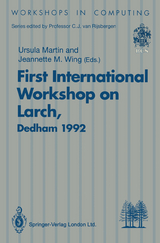First International Workshop on Larch
Is Engineering Software Amenable to Formal Specification?.- How to Prove Observational Theorems with LP.- Using SOS Definitions in Term Rewriting Proofs.- An exercise in LP: The Proof of a Non Restoring Division circuit.- Integrating ASSPEGIQUE and LP.- Mechanical Verification of Concurrent Systems with TLA.- The DECspec Project: Tools for Larch/C.- Formal Verification of Ada Programs.- A Semantics for a Larch/Modula-3 Interface Language.- Preliminary Design of Larch/C++.- Generating Proof Obligations for Circuits.- Using Transformations and Verification in Circuit Design.- Using LP to Study the Language PL 0 + .- Semantic Analysis of Larch Interface Specifications.- Optimizing Programs with Partial Specifications.- A new Front-End for the Larch Prover.- Thoughts on a Larch/ML and a New Application for LP.
| Erscheint lt. Verlag | 22.4.1993 |
|---|---|
| Reihe/Serie | Workshops in Computing |
| Zusatzinfo | VIII, 315 p. 4 illus. |
| Verlagsort | London |
| Sprache | englisch |
| Maße | 155 x 235 mm |
| Gewicht | 560 g |
| Themenwelt | Mathematik / Informatik ► Informatik ► Programmiersprachen / -werkzeuge |
| Mathematik / Informatik ► Informatik ► Software Entwicklung | |
| Informatik ► Theorie / Studium ► Compilerbau | |
| Schlagworte | ADA • C++ programming language • Design • Development • formal specification • language • Mathematica • ML • Modula-3 • programming • Programming language • Programming Languages • Semantics • Software • system development • verification |
| ISBN-13 | 9783540198048 / 9783540198048 |
| Zustand | Neuware |
| Informationen gemäß Produktsicherheitsverordnung (GPSR) | |
| Haben Sie eine Frage zum Produkt? |
aus dem Bereich




